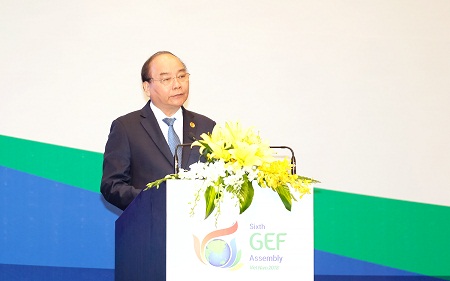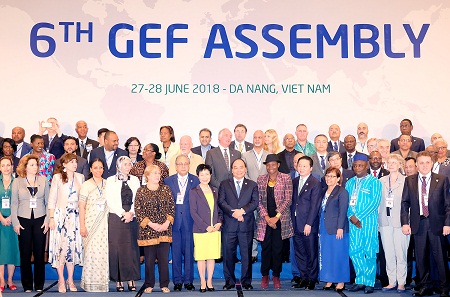Viet Nam is a favorable location for the Global Environment Facility (GEF) to implement its new projects on environmental protection, and is willing to get involved in global, inter-regional and inter-field projects, aiming to share and learn experience in handling global environmental issues, such as plastic waste in the ocean and the preservation of biodiversity.

PM Nguyen Xuan Phuc addresses the 6th Assembly of the Global Environment Facility in the central coastal city of Da Nang on June 27. Photo: VGP
Prime Minister Nguyen Xuan Phuc made the statement while addressing the opening session of the 6th Assembly of the Global Environment Facility (GEF) in the central coastal city of Da Nang on June 27.
According to the Vietnamese leader, Earth, the common house of humanity, is suffering from severe impacts due to degradation, environmental pollution, climate change, and rising sea level. Those big challenges also offer an opportunity for the mankind to look into and review development paths and patterns, thereby creating changes in perception and action to protect natural habitats globally, he said.
PM Phuc stated that as a developing country, Viet Nam has to face a lot of problems in terms of degradation, environmental pollution, climate change, and rising sea level. Despite difficulties and limitations in resources, the Vietnamese government has resolutely incorporated the environmental protection and climate change response activities into the country’s socio-economic development plan, while mobilizing resources, creativity, and the joint efforts of both the business community and the people.

PM Nguyen Xuan Phuc and participants to the 6th Assembly of the Global Environment Facility. Photo: VGP
Viet Nam does not trade off the environment for economic development at any costs, he said, noting that the country is striving to implement the United Nations’ sustainable development goals (SDGs) as well as its commitments at the COP-21 conference on climate change.
The PM stressed the need to clearly identify the major environmental challenges facing humanity today, thus designing the priority policies aimed at the effective handling of those challenges, in addition to evaluating the efficiency of the current cooperation and support mechanisms, especially in the mobilisation and allocation of resources to support member countries.
It is also necessary to propose the global, interregional and inter-field projects aiming to address the underlying causes of pollution, environmental degradation, biodiversity loss and climate change, while building key projects to deal with the current pressing issues, such as plastic waste in general and plastic waste in the ocean in particular, he said.
By Vien Nhu